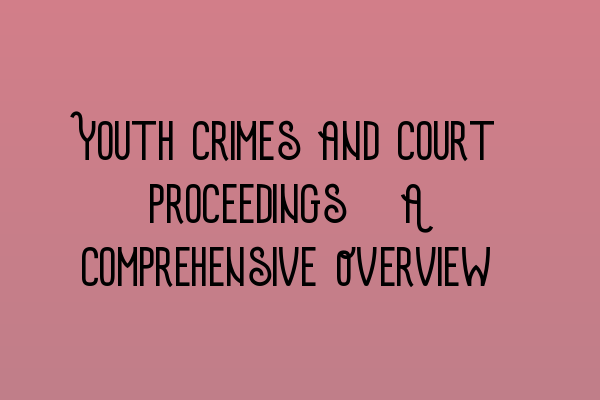Youth Crimes and Court Proceedings: A Comprehensive Overview
When it comes to youth crimes, understanding the court proceedings is crucial for both the accused and their families. With the aim of providing clarity, this comprehensive overview delves into the legal intricacies of youth crimes and the subsequent court procedures.
The Definition of Youth Crimes
Youth crimes, also known as juvenile offenses, refer to criminal acts committed by individuals under the age of 18. Common examples include theft, vandalism, drug offenses, and assault. The legal system recognizes that young individuals may lack the maturity and judgment of adults and strives to handle their cases differently.
Initial Steps: Contacting a Solicitor
Upon being accused of a youth crime, it is essential to seek legal representation as soon as possible. A skilled solicitor who specializes in youth criminal law can guide the accused through the intricate court process, protect their rights, and ensure that their case is presented effectively.
Court Proceedings for Youth Crimes
The court procedures for youth crimes differ from those of adult offenses. Here is a breakdown of the key stages:
- Arrest: If the young person is arrested, they must be informed of their rights and the reason for the arrest. It’s crucial that their parents or guardians are also notified.
- Police Interview: The accused is entitled to have their solicitor present during the police interview. The solicitor can provide legal advice and ensure a fair process.
- Charge or Caution: After the police interview, the young person may be charged or given a caution. A caution is a formal warning without going through court proceedings, while a charge leads to further legal action.
- Court Hearings: If the case proceeds to court, there will be various hearings, including an initial appearance, bail hearing, case management hearing, and potentially a trial. The accused has the right to legal representation throughout these proceedings.
- Sentencing: If found guilty, the court will determine the appropriate sentencing. Sentencing options for youth crimes can range from rehabilitation programs and community service to probation and, in more serious cases, custodial sentences.
The Role of Rehabilitation and Youth Justice
Unlike adult criminal justice systems that focus primarily on punishment, the youth justice system places a strong emphasis on rehabilitation. Its goal is to support young offenders in turning their lives around and reintegrating into society as law-abiding citizens. Rehabilitation programs may include counseling, education, community service, and substance abuse treatment.
Seek Professional Legal Assistance
When facing a youth crime charge, it is vital to seek professional legal assistance to ensure that your rights are protected throughout the court process. At SQE Criminal Law & Practice Law UK, we have experienced solicitors who specialize in youth criminal law. Contact us today for expert advice and representation.
